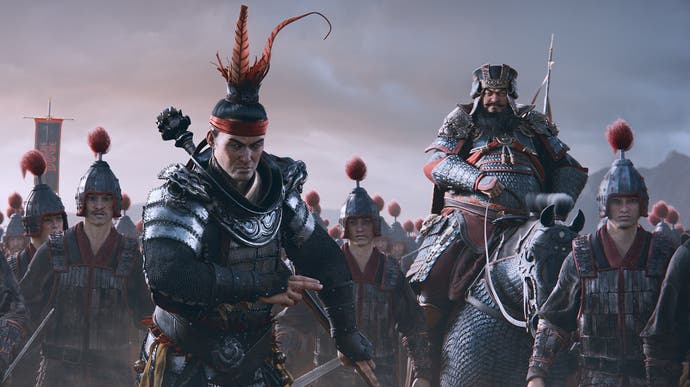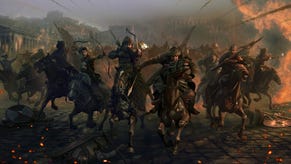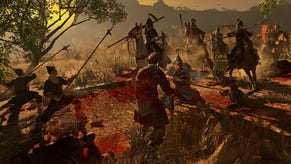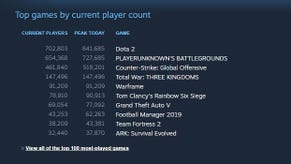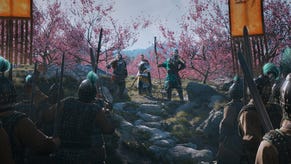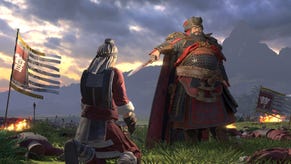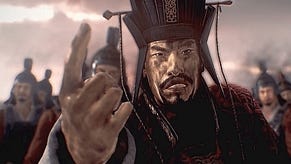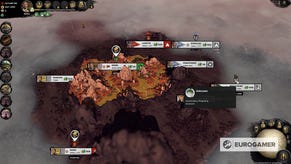Hands on with the romantic battles of Total War: Three Kingdoms
Guan Yu beauty!
"Art-driven" design, "mythical" characters, Wushu (yes, Wushu!). Total War: Three Kingdoms is the next historical entry to the grand strategy series but, boy, it really sounds like another fantasy game on paper. Watching developer Creative Assembly's E3 presentation I can almost feel the hand-wringing before it's begun - but, clearly, so can the developers, because in a stroke of simple genius they've already thought of that, already devised a solution, and already have an answer for me, before I even ask the question.
That's because Total War: The Kingdoms has two campaigns: a "Romance" mode and a "Classic" mode. One for the novel, The Romance of the Three Kingdoms, a sweeping epic of power, betrayal and warriors who slay a thousand men; one for the history books, like Records of the Three Kingdoms, a sweeping epic of power, betrayal and precise accounts of taxation levies and military formations.
I didn't get to see how this played out in the campaign, but I did get a look at "romance" version of a siege battle, where much of the game's changes are immediately evident. Creative Assembly is keen to stress the emphasis on character, above all, in Three Kingdoms. In the campaign map it'll come through in the form of "Guanxi" - a sense of connection, relationship and reciprocity - that I'm told will underpin much of your decision-making and that of your AI opponent's. In battle, it's most evident in your generals.
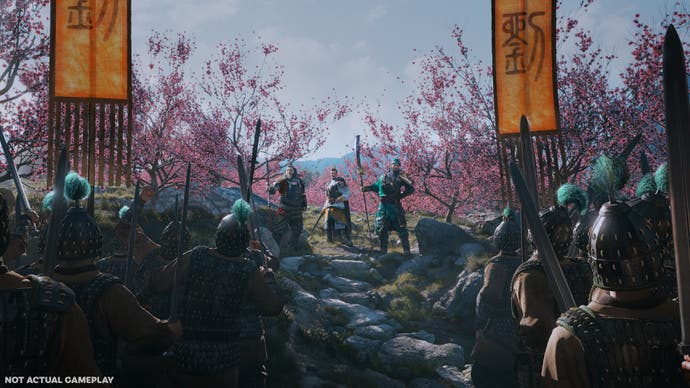
You can now have multiple generals in a battle and, instead of one big bar along the bottom for all of your units on the field, they're split into Retinues, separate groups of units each governed by their relative commander. On the campaign map commanders can recruit exclusive units and give units of their specialised type certain buffs and bonuses. In battle, those commanders - all named characters, of which there are apparently over a thousand - will have their own specialities, too.
One of my generals in this siege for instance was Cao Cao, the brilliant strategist loved by fans of the Three Kingdoms story and featured heavily in the recent trailer. Generals now have their own sub-classes and Cao Cao is, naturally, a Strategist, which grants various active and passive buffs for your units. On the other hand, more combat-oriented generals will be in the Guardian class, which essentially turns them into a hefty tank, capable of taking huge amounts of damage, that you want to use to plug gaps or initiate breaches.
The effect is that success is now going to rely on you using and countering these characters effectively. I learned that the hard way in this siege, against the legendary Lu Bu, a man who claims to have slain thousands of men in battle and who did indeed slay an awful lot of my men in battle. Underestimating the strength of an opponent like this will evidently cost you - but just the same good execution of a plan to stop them can give you a massive advantage. In this siege, for instance, I could win both by capturing the central point of the city (like usual), or by killing Lu Bu at any point.
Leaning even further into the emphasis on characters in the romance mode is the introduction of Duels - strictly one-on-one wushu combat between two opposing generals. At just about any time, you can select any combat-based general in battle and click the "Duel" button to bring up options of duellable enemy commanders. Select one - in this case my only option was Lu Bu - and they'll run off to face them. Nearby warriors will clear off, and the camera will zoom into a kind of cinematic showdown. You can affect this by pressing any active abilities that your commander might have, and by weakening the opponent first in standard combat, but from what I saw that's about it - once they're locked in combat it's a fight to the death (or someone running away), and it can be absolutely decisive.
This, I think, is where a lot of traditional Total War players will draw the line. Thankfully for them, there's obviously the regular, historical campaign mode that does away with these kinds of flourishes. But for the romantics who want to play the more mythologised version of the Three Kingdoms saga it's still going to be a point of contention - not so much because it takes a step too far from realism, but because it seems, at this early stage, that these larger-than-life characters require a significant amount of your attention, perhaps to a fault. Knowing when to initiate a Duel, and how to effectively counter or fudge one to your advantage is probably going to be an essential skill.
The obvious counter to any worries about that is the fact that, aside from providing a narrative direction to your playthrough, these characters also give more of an anchor to the battles themselves. If there was one thing the Total War: Warhammer games showed it's that providing a focal point - giant units, spellcasting Wizards, mouthy generals - is a brilliant means of upping the stakes for the players who aren't as able to invest themselves in the minutiae of, say, taking out a regular unit that to the layman looks like any other, but has some slightly better armour. Then again, historical purists will say that's the point.
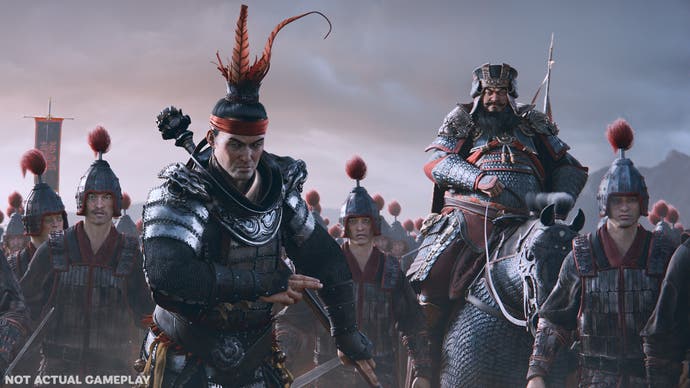
There are other tweaks and changes: items can now be "looted" from killing enemy characters - Lu Bu's ultra-fast horse, Red Hare, for instance, but I'm assured that characters will always start as those characters, with no quests to get special weapons or armour like say, Karl Franz's quest to get Ghal Maraz in Total War: Warhammer. Siege AI as been reworked, particularly when the AI is defending, so that when it senses defeat is imminent at one stage, like when defending an outer wall, it'll pull its units back to a more defensible inner choke-point, rather than throwing more into the grinder. The UI, too, has had something of a rework - it's gorgeous, from what I saw, although one aspect I found a tad finickity was the reduction of in-battle banners to smaller circles above your units, which made it a little harder to immediately tell whether they were wavering, or doing well.
It's too early to call, of course, how both those little things and the more sweeping changes will truly settle, especially as I haven't seen how the changes to the campaign map and individual battles weave together. At the very least it's a shake-up though: Total War has never had this kind of single-game split between hard fact and mythology before, it's never placed individual characters in such a prominent role, and it's never felt like the spirit of an era has so clearly shaped and defined the game as a whole - right down to the impressionist brush-strokes, used to accentuate key features like shields and mounts, on unit tiles in a battle (a smart and beautiful part of the new UI that was much easier to love). A lot of it is massively exciting, frankly - and it's strange to think that with the introduction of two modes, so much of the risk of all those changes has, hopefully, been swept away before we ever need to worry about it.
